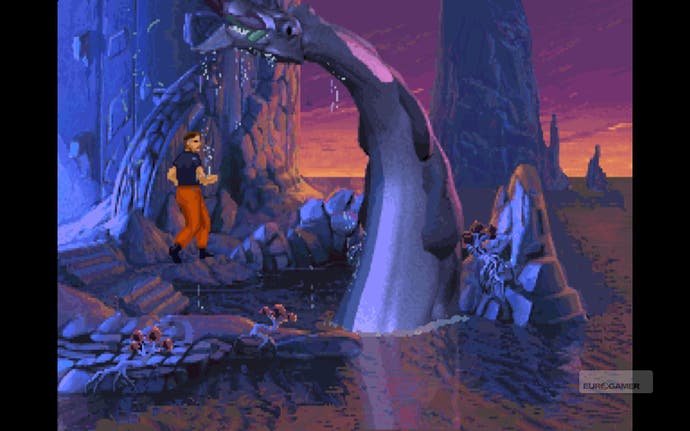Retrospective: The Dig
A world away.
This opening, briefly interactive as you place and detonate the charges, and then discover the reality of the asteroid, is vividly alive with character establishment. The superb opening sequences show a rare subtlety, the careful, deliberate speech of a press conference delivered over realistic hubbub of excited press, underlined with Michael Land's mesmeric orchestral score. It's underplayed, modest.
Then when in space, against a background of Land's ambient music, five characters are convincingly made real through realistic, unforced dialogue that doesn't rely on clumsy exposition. The strong sense of a long friendship between mission leader Low and technician Miles is the most evocative, as they warmly tease each other over the radio comms. Brink is quickly established as the prissy, awkward member of the team. A German accent is perhaps lazy shorthand for his portent of rebellion, but he's quick-witted and self-assured, and his place on the team is believable. The outsider is Maggie Robbins, a member of the press and seen as a threat by the others. The others gently haze her into their trust, constantly implying she's armed with ulterior motives, half in jest, half in concern. Just through this brief banter, so much is told and so much history is conveyed.
A large part of this success is thanks to the quality of the voice acting. The lead role, the exquisitely named Boston Low, is voiced by Robert Patrick (there's even a Terminator 2 reference hidden in there), who gives warmth and life to his character. Mari Weiss's Maggie captures a perfect mix of confidence and disquiet. And Steven Blum never lets Brink's accent descend into moustache-twirling pantomime, but instead acknowledges the complexity of a man doomed to be the bad guy, while a fairly decent person.
The planet on which they appear (generally known as Cocytus by fans, since this was the name given to it by Brink in the Alan Dean Foster novel based on the game) is barren, bearing the scars of a lifeform whose technology had clearly been focused around geometry. For a glorious time you have nothing but four locations in a crater to visit, each equally funereal in their representation. A grave for a horned beast exposes ancient bones. A wrecked spacecraft built of twisted metal and ruined shredded wiring suggests more death, deaths of other species. It's in the wreck that you first witness a "ghost", the remnants of the creatures that once lived on the planet, and gain entry to the underground passageways that slowly give you access to the farther extremes of a former city.

Of course, it's still an adventure game, so throughout all this there's both the pleasure and pain of puzzles. Some terrible hotspotting leads to frustration, and the first major puzzle is just idiotically difficult. Required to recover a lens from the bottom of a vast pit, crackling with an ancient energy source, you are supposed to interpret alien technology to direct a robot to pick it up and place it on its mounting. To explain what this puzzle requires would take up as much space as this entire piece again, but suffice to say it's ludicrous. Perhaps toward the end of an otherwise reasonably simple game it might have made some progressive sense, but to open with something so obscure and fiddly was madness.
However, thankfully the pleasure dominates throughout. Although perhaps that's not the ideal word. For those who assume LucasArts adventures will deliver a constant stream of gags, The Dig is astoundingly different. It's woefully incorrect to suggest there's no humour - there's very many lovely, funny moments between the team as they chat. But it's natural, effortless humour, likely to make you smile rather than laugh. But there's also tragedy.








